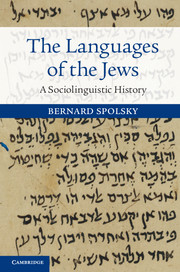Book contents
- Frontmatter
- Dedication
- Contents
- List of maps
- Preface and acknowledgments
- Glossary
- 1 Is Hebrew an endangered language?
- 2 The emergence of Hebrew
- 3 Hebrew–Aramaic bilingualism and competition
- 4 Three languages in Hellenistic and Roman Palestine
- 5 From statehood to Diaspora
- 6 The Arabian and African connections
- 7 The spread of Islam
- 8 The Jews of France
- 9 The Jews of Spain and their languages
- 10 Loter-Ashkenaz and the creation of Yiddish
- 11 The Yavanic area: Greece and Italy
- 12 Jews in Slavic lands
- 13 Linguistic emancipation and assimilation in Europe
- 14 Britain, its former colonies, and the New World
- 15 Islam and the Orient
- 16 The return to Zion and Hebrew
- Appendix Estimated current status of Jewish languages1
- Notes
- References
- Index
5 - From statehood to Diaspora
Published online by Cambridge University Press: 05 June 2014
- Frontmatter
- Dedication
- Contents
- List of maps
- Preface and acknowledgments
- Glossary
- 1 Is Hebrew an endangered language?
- 2 The emergence of Hebrew
- 3 Hebrew–Aramaic bilingualism and competition
- 4 Three languages in Hellenistic and Roman Palestine
- 5 From statehood to Diaspora
- 6 The Arabian and African connections
- 7 The spread of Islam
- 8 The Jews of France
- 9 The Jews of Spain and their languages
- 10 Loter-Ashkenaz and the creation of Yiddish
- 11 The Yavanic area: Greece and Italy
- 12 Jews in Slavic lands
- 13 Linguistic emancipation and assimilation in Europe
- 14 Britain, its former colonies, and the New World
- 15 Islam and the Orient
- 16 The return to Zion and Hebrew
- Appendix Estimated current status of Jewish languages1
- Notes
- References
- Index
Summary
The loss of statehood
The Hellenization of Judea (which from a language point of view meant adding Greek to the Jewish sociolinguistic ecology after the conquest of Alexander the Great) bled almost unnoticeably into the period of Roman rule, which, as noted earlier, did not mean a substantive addition of Latin except in government use and on official inscriptions. This period marks the beginning of Jewish trilingualism (or perhaps even triglossia), which we will find, with occasional exceptions, to be the dominant model at least until the eighteenth century, when western European emancipation started to weaken the role of Jewish varieties. A first question is where to start our chapter, and how to label the period it describes.
Without doubt, the destruction of the Second Temple in 70 CE was a major turning point, when centralized Temple rituals were replaced by synagogue worship and priestly leadership gave way to rabbinic. But was this a major linguistic transition? Synagogue worship was already under way and Diaspora communities were already in existence before 70 CE. Indeed, by 100 CE there were 5 million Jews in the Diaspora, five times the estimated 1 million who remained in Palestine. Perhaps one should, rather, select as a starting point the Bar Kokhba revolt in 136 CE, one of the last attempts to restore Jewish sovereignty; its failure marked the beginning of nearly 2,000 years of dispersion. But there were other revolts later, up to the Arab conquest. Or should we label it a Hellenistic-Roman period, which in Palestinian archeological terms included Byzantine rule until the Arab conquest?
- Type
- Chapter
- Information
- The Languages of the JewsA Sociolinguistic History, pp. 63 - 79Publisher: Cambridge University PressPrint publication year: 2014



